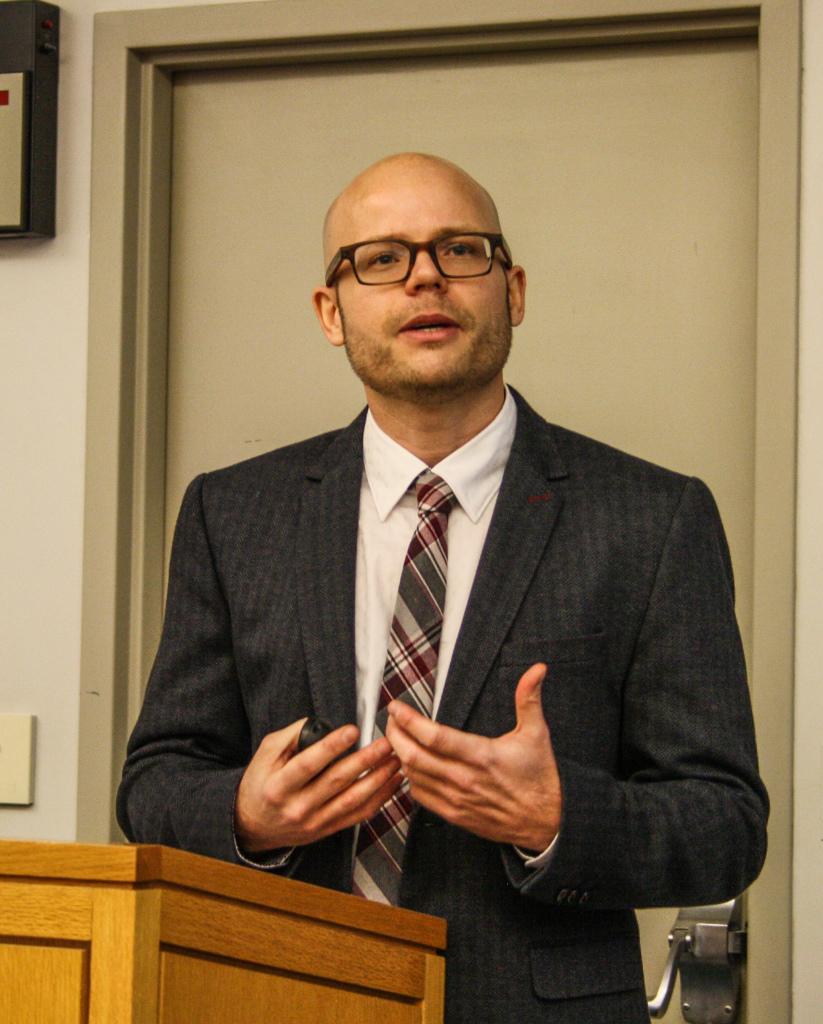On Tuesday, Dec. 9, political scientist and international relations expert Kai Hebel spoke in ARH 102 about the “Helsinki model” of conflict transformation.
Hebel, who is currently working at Oxford University as the Boskey Fellow in International Relations, is a candidate for Grinnell’s prestigious Andrew Mellon Postdoctoral Fellowship, which would place him at Grinnell College for two years of research and teaching. This lecture was a part of his interview process to see if he would be a good fit for the College.
Hebel’s recent research has focused on the Helsinki Accords and their potential to transform current and future conflicts. The Helsinki Accords were a series of meetings during the 1970s amongst 35 states, mostly in Europe and including Canada and the United States, which attempted to normalize relations between the Soviet Bloc and the Western nations. The Accords culminated in the Helsinki Declaration, which was comprised of a series of non-binding agreements covering everything from human rights to economic policy.
When conducting his research, Hebel found significant gaps and misconceptions in the existing literature about the Accords.
“There was no reliable study on the process based in archival evidence,” he said, stating that his research was unique in the fact that he “was able to tap into the archives of all the players.”
Much of Hebel’s lecture focused on dispelling the common myths about the process, which he labeled as “dangerous.” The first and most pervasive misunderstanding is that the Helsinki process was a case study in the use of coercive action.
“The argument is that the West was able to arm twist communist nations to cave in,” Hebel said.
He asserted that this narrative was not the case, but that “[the Helsinki Process] was non-coercive, it was inclusive, it was a flexible process, at the same time it was consensus oriented.”
It was the inclusive nature of the process that Hebel argues was key in building the “stable peace” that emerged from the Accords.
“Process is key, and much more important than substance at times,” Hebel said.
In his view, the inclusive framework of the Accords was targeted at addressing the problem of trust at the root of the tensions between East and West.
“The psychological presumption was one of mistrust,” Hebel said, explaining the political atmosphere at the time.
To illustrate his point, Hebel referenced a quote by the career U.S. diplomat Helmut Sonnenfeldt.
“We face a psychological problem, Soviet paranoia,” he said. “Treaties with the USSR are in part a kind of necessary psychotherapy.”
Hebel theorized that these trust-building measures were the key to this psychotherapy, and that these measures worked on two levels. First, the interactions between diplomats on both sides fostered a “routinization of cooperation,” which built up a certain degree of trust as diplomats began to know each other. These positive interactions were soon constructed into a framework in which the diplomats could use in future communication, Hebel argued.
Secondly, both sides initiated the Helsinki process by giving concessions.
“They want to know that they’re dealing with a sheep in sheep’s clothing,” Hebel noted, emphasizing that the concessions demonstrated the seriousness of the nations’ intentions.
In concluding his talk, Hebel examined the possibility of exporting the model of the Helsinki Accords to new international conflicts across the globe. Hebel mentioned that Iran was a prime example of one situation in which the process could work well, but he criticized recent U.S. policy in the country, saying, “sanctions are not cooperative.”
Professor Geoffrey Macdonald, Political Science, found Hebel’s talk to be intriguing and well-researched and said that he looks forward to seeing how this account of the Helsinki Accords will play a role in navigating future foreign policy.
“I thought Dr. Hebel provided a fascinating account of a diplomatic process few people have studied in depth. With so many diplomatic crises going on today—from Iran to Crimea to Israel-Palestine—his research gives us hope that negotiations can reduce international tension,” Macdonald wrote in an email to The S&B.

Photo by Megan Pachner.





























































